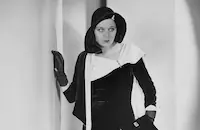Whirlpool

Brief Synopsis
Cast & Crew
Roy William Neill
Jack Holt
Jean Arthur
Donald Cook
Allan Jenkins
Lila Lee
Photos & Videos
Film Details
Technical Specs

Synopsis
In 1910, Buck Rankin, owner of a crooked carnival, convinces the reluctant Helen, a local woman he has met, to marry him. Buck plans to sell the show for $10,000, but a fight breaks out at the carnival and a riot ensues. Buck is convicted of manslaughter for the death of a man accidentally killed during the riot, and he receives a twenty year sentence. Eight months later, Helen comes to see him, and after he urges her to get a divorce, she informs him that she is pregnant. Determined to force Helen to find happiness elsewhere, Buck forges a note from the warden saying he died in the whirlpool outside the prison while attempting to escape. Buck is released in 1929 and reunites with his old carnival buddy, Mac. By 1934, Buck is an important nightclub owner, using the alias Duke Sheldon. Buck is scheduled to fly to New York to provide an alibi for gangster Big Time Kelly, and the Morning Globe assigns reporter Sandra Morrison to the story. However, when Buck arrives at the club, Sandra recognizes him from a picture her mother has kept, then notices that he is wearing a ring identical to one she has. Sandy explains to Buck that she is his daughter. Knowing that Helen would see the publicity if he appeared in the Kelly trial, Buck cancels his trip to spare Helen's reputation. Sandy secures a new assignment from the editor, but her fiancée, Bob Andrews, is assigned to follow Buck, and is soon jealous from seeing Sandy and Buck together constantly. Also jealous of Sandy is Thelma, a singer in Buck's club. Barney Gaige, a shyster lawyer, tries to get Buck to testify for Kelly, but his efforts are futile. Through Thelma, Barney learns about Buck's past and blackmails him with exposure unless he testifies. Buck shoots Barney, then sends Mac, Sandy and Bob away. As the police arrive, Buck destroys all evidence of his relationship with Helen, then turns the gun on himself. Sadly, Bob and Sandy cannot tell Helen the truth about the death of "racketeer" Duke Sheldon, which she reads about in the newspaper.

Director
Roy William Neill
Cast

Jack Holt

Jean Arthur

Donald Cook

Allan Jenkins

Lila Lee

John Miljan

Rita La Roy
Oscar Apfel
Willard Robertson

Ward Bond
Al Hill
John M. Sullivan
A. R. Haysel
Frank O'connor
Max Barwyn
Gino Corrado
Phil Dunham
Blanche Payson
Earl Hodgins
Harrison Greene
Jack Baxley
Lowden Adams
Maidena Armstrong
James Bradbury Jr.
Ethel Sykes
Billie Van Every
Jolly Lee Harvey
Bud Davies
Tony Merlo
Edward Cecil
Jack Curtis
Charles Mcmurphy
Ed Schaefer
Monte Vandegrift
Jerry Storm
Richard Sumner
Harry Bowen
Lillian West
Lottie Hildebrand
Rosalie Lincoln
Margaret Ehrlich
Lu Ann Meredith
Rosita Foucher
Jack Long
Crew
Jack Anderson
Joseph August
F. M. Browne
Richard Cahoon
Harry Cohn
Fred Dawson
Evelyn Fontayne
Marcel Grand
Ethel Hill
John Hoffman
Dorothy Howell
Al Keller
Benjamin Kline
Wilbur Mcgaugh
Robert North
Dave Ragin
Howard Emmett Rogers
Glenn Rominger
Jack Russell
A. L. Schafer
John Stumar

Photo Collections
Film Details
Technical Specs

Articles
Whirlpool (1934)
The film was based on a story by Howard Emmett Rogers (who also wrote For Me and My Gal [1942] and Libeled Lady [1936]) and was directed by Roy William Neill, most famous for directing the later Sherlock Holmes films starring Basil Rathbone. Jean Arthur had appeared in over 50 films by 1934, beginning her career in the silent days when she was a brunette. A stage actress, she had been dissatisfied with the caliber of roles she was getting in Hollywood and had left for two years to go back to the stage in New York and summer stock. She returned to Hollywood for Whirlpool, which was important to her career, even though it was not a smash hit.
John Oller, in his book, Jean Arthur: The Actress Nobody Knew wrote that Whirlpool was important because it was the first film that "allowed Arthur to engage in genuine repartee. Whirlpool was also the first film in which Arthur played a traditionally masculine role - here, a big-city newspaper reporter. She appears relaxed and confident, almost brash at times. While critics have tended to overlook Whirlpool in tracing Arthur's metamorphosis as a film actress, it remains the earliest film in which one can recognize the Jean Arthur of the classic movies of her later years." Arthur appeared as a newspaper reporter in several films, including the one that catapulted her to stardom two years later, Mr. Deeds Goes to Town (1936), and most famously, in Mr. Smith Goes to Washington (1939).
Jean Arthur received an excellent notice from The New York Herald Tribune's Howard Barnes, who noted her "brilliant and thoroughly plausible portrayal of a difficult role, marking her as a first-rate actress." Barnes wrote that Holt's performance was "quite overshadowed by that of Miss Arthur. In a role calling for subtle inflections and a sure sense of the values in human relationships, she is altogether admirable, giving the whole production most of the poignancy and inevitable tragedy to which it pretends."
Director: Roy William Neill
Screenplay: Dorothy Howell, Ethel Hill; Howard Emmett Rogers (story)
Cinematography: Benjamin Kline; Joseph H. August, John Stumar (both uncredited)
Music: Mischa Bakaleinikoff, Louis Silvers (uncredited)
Film Editing: Richard Cahoon
Cast: Jack Holt (Buck Rankin), Jean Arthur (Sandra Morrison), Donald Cook (Bob Andrews), Allen Jenkins (Mac), Lila Lee (Helen Morrison), John Miljan (Barney Gaige), Rita La Roy (Thelma), Oscar Apfel (Editor), Willard Robertson (Judge Jim Morrison), Ward Bond (Farley), Warren G. Harding (President Harding, archive footage).
BW-73m.
by Lorraine LoBianco
SOURCES
The Internet Movie Database
Jean Arthur: The Actress Nobody Knows by John Oller














